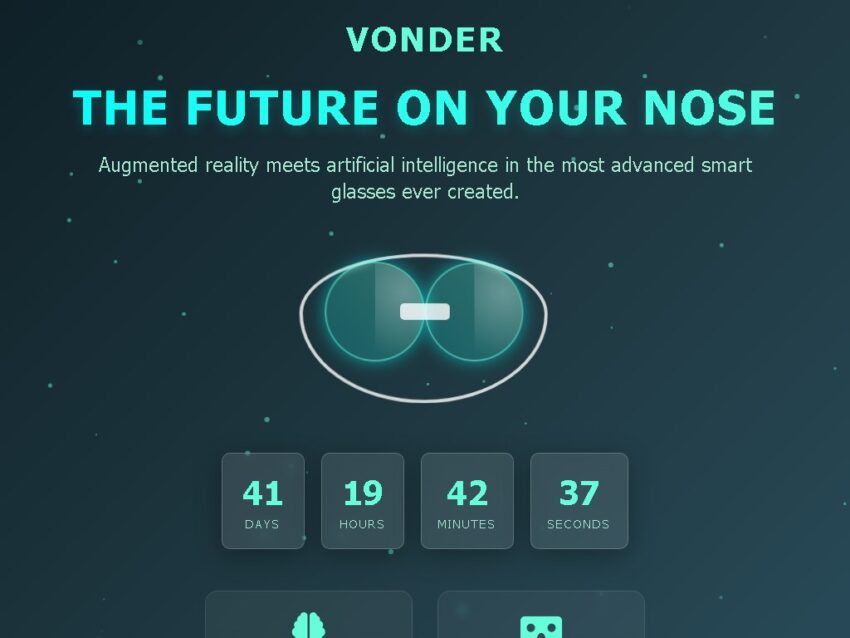
ar startup viture is stealthily working on Viture, a relatively unknown startup, is making strides in the augmented reality (AR) space with plans to launch a new line of AI-powered glasses, potentially challenging established players like Meta.
ar startup viture is stealthily working on
Introduction to Viture and Its Ambitions
Viture, operating under the Vonder brand, is gearing up to unveil its first pair of AI glasses around the Consumer Electronics Show (CES). This announcement comes on the heels of a staging website that seems to have been published prematurely, along with a recent filing with the Federal Communications Commission (FCC). The company is positioning itself to disrupt the AR-powered smart glasses market, which has been dominated by tech giants like Meta and Google.
The Technology Behind Viture’s AI Glasses
Viture’s glasses are touted as “the most advanced smart glasses ever created.” While specific technical details remain sparse, the company claims to integrate augmented reality with real-time information and assistance capabilities. This suggests a focus on enhancing user experience through seamless interaction with digital content overlaid on the physical world.
Augmented Reality and Its Applications
Augmented reality technology superimposes digital information onto the real world, providing users with a unique blend of both environments. Applications range from gaming and entertainment to practical uses in navigation, education, and remote assistance. By leveraging AR, Viture aims to create a device that not only serves as a fashion accessory but also enhances daily life through practical functionalities.
Potential Features of Viture’s AI Glasses
While the exact features of Viture’s AI glasses have not been disclosed, several possibilities can be inferred based on current trends in AR technology:
- Real-Time Information Display: Users could receive notifications, directions, or other relevant data directly in their line of sight.
- Voice Assistance: Integration with AI voice assistants could allow for hands-free operation, enabling users to interact with their environment without needing to touch their devices.
- Gesture Control: Advanced sensors might enable users to control the glasses through simple hand gestures, making the interaction more intuitive.
- Social Connectivity: The glasses could facilitate social interactions by displaying information about people in the user’s vicinity, enhancing networking opportunities.
Market Context and Competitive Landscape
The AR glasses market is becoming increasingly competitive, with several key players vying for dominance. Meta, with its Ray-Ban Stories and ongoing development of the Meta Quest series, has established a significant presence. Other companies, such as Google and Apple, are also rumored to be working on their own AR solutions. Viture’s entry into this space could shake up the status quo.
Meta’s Current Position
Meta has invested heavily in AR and virtual reality technologies, viewing them as integral to the future of social interaction and digital communication. The company’s focus on creating a metaverse—a collective virtual shared space—has driven its development of smart glasses. However, the performance and user adoption of these devices have been mixed, leading to questions about their long-term viability.
Other Competitors
Aside from Meta, companies like Google and Apple are also making significant strides in AR technology. Google has previously experimented with AR through its Google Glass project, which, despite initial setbacks, laid the groundwork for future developments. Apple, on the other hand, is rumored to be working on a highly anticipated AR headset, which could redefine user expectations in the space.
Implications of Viture’s Entry
The introduction of Viture’s AI glasses could have several implications for the AR market:
- Increased Innovation: Competition often drives innovation. Viture’s entry may prompt existing players to enhance their offerings, leading to more advanced features and better user experiences.
- Market Diversification: A new player like Viture could diversify the market, offering consumers more choices and potentially lower prices as competition heats up.
- Shifts in Consumer Expectations: As new technologies emerge, consumer expectations will evolve. Viture’s focus on AI integration may set a new standard for what users expect from smart glasses.
Stakeholder Reactions
While Viture’s plans are still under wraps, reactions from industry stakeholders have begun to surface. Analysts are cautiously optimistic about the startup’s potential, noting that the AR market is ripe for disruption. However, skepticism remains regarding whether Viture can deliver on its ambitious promises.
Industry Analysts’ Perspectives
Industry analysts have expressed mixed feelings about Viture’s prospects. Some believe that the company’s focus on AI could provide a significant edge over competitors, while others caution that entering a market dominated by established players is fraught with challenges. The ability to differentiate its product and effectively market it will be crucial for Viture’s success.
Consumer Sentiment
Consumer interest in AR technology has been steadily growing, particularly among tech enthusiasts and early adopters. However, mainstream acceptance remains a hurdle. Many consumers are still uncertain about the practical applications of AR glasses in their daily lives. Viture will need to address these concerns through effective marketing and demonstration of the glasses’ capabilities.
Future Prospects for Viture
As Viture prepares for its launch, the company’s future will hinge on several factors:
- Product Development: The ability to deliver a high-quality, functional product will be paramount. Viture must ensure that its glasses meet consumer expectations and offer unique features that set them apart from competitors.
- Marketing Strategy: A robust marketing strategy will be essential to build brand awareness and generate interest in the product. Viture will need to effectively communicate the benefits of its glasses to potential users.
- Partnerships and Collaborations: Collaborating with other tech companies or platforms could enhance the functionality of Viture’s glasses, making them more appealing to consumers.
Conclusion
Viture’s entry into the AR glasses market represents a significant development in the ongoing evolution of augmented reality technology. As the company prepares to launch its AI glasses, it faces both opportunities and challenges in a competitive landscape. The implications of its success or failure could reverberate throughout the industry, influencing the direction of AR technology for years to come. With the CES launch on the horizon, all eyes will be on Viture to see if it can deliver on its ambitious promises and carve out a niche in this rapidly evolving market.
Source: Original report
Was this helpful?
Last Modified: November 20, 2025 at 9:36 pm
3 views














